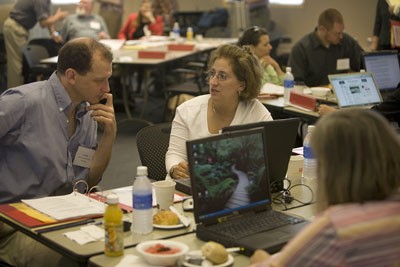Library starts undergrad information project to get students beyond Google
By Gwen Glazer
In the digital age, research changes at the speed of broadband.
It's nothing new for librarians to help people learn research skills, but the Internet revolution demands more than a chat at the reference desk. That is why the Cornell University Library has launched the Cornell Undergraduate Information Competency Initiative.
"The goal of the project is to sustain a community dedicated to improving student research skills, as well as teaching and learning," said Camille Andrews, instruction coordinator at Mann Library and one of the project's organizers.
Last June, Andrews and law librarian Thomas Mills headed an institute in which nine faculty members were paired with each other and a librarian, an information technologist and an instructional designer to redesign the research portion of their courses to improve undergraduate research and information literacy skills.
"That group structure was one of the most important things we did, because it gave the institute an amazing energy," said Andrews, who noted that another institute is slated for June 1-5. "The participants all sparked off each other and gave each other ideas."
At the end of the institute, the faculty members, along with librarians, presented their ideas, and then subsequently implemented changes in their courses. A small stipend allowed faculty to fund, for example, new databases or computer hardware or conference attendance to further learning.
The program has resulted in such curricular changes as:
- In a course on tropical crops in developing countries, Peter Hobbs, adjunct professor of crop and soil sciences, included sessions co-taught by a librarian and group research projects using a student-developed wiki.
- Lecturers Laurel Hester and Kuei-Chiu Che's large introductory biology class created peer-judged posters after taking an online tutorial on scientific article research.
- Lecturer Jami Carlacio's English class created multimedia projects examining the news media and received instruction in finding images and video, as well as evaluating the media they found.
Christine Ranney, associate professor in applied economics and management, said she found the institute's activities "utterly thrilling" and appreciated the chance to focus exclusively on her teaching.
The 2009 program will have an increased focus on digital literacy, assessment and collaboration.
"The goal of the initiative is to break down the silos," Mills said. "Artificial divisions we make don't help students. We need that cross-collaboration. We're all working toward the same goal -- student learning -- and the more we can collaborate, the more we help the students."
The program, which is in partnership with Cornell Information Technologies, the Center for Teaching Excellence and others, was so successful that the library and vice provost for undergraduate education announced they would jointly support another year of funding; April 2 is the application deadline for the June institute.
For more about the program or to apply, visit http://infocomp.library.cornell.edu/.
Gwen Glazer is a staff writer for Library Communications.
Media Contact
Nicola Pytell
Get Cornell news delivered right to your inbox.
Subscribe